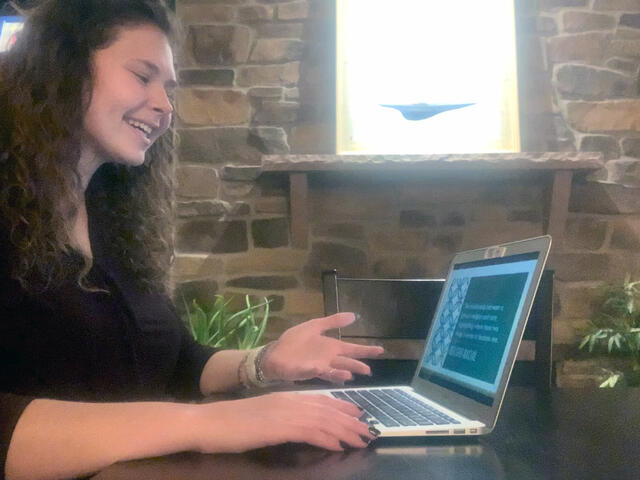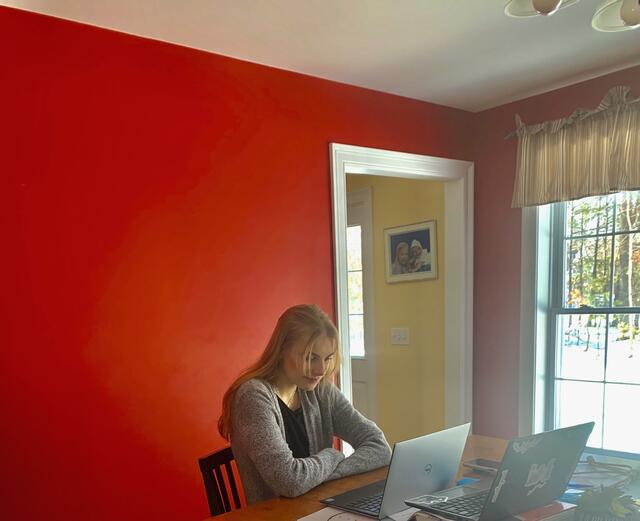Honors students present research at virtual Maryland Collegiate Honors Conference
Four students represented McDaniel College at the Maryland Collegiate Honors Conference, “In Honors, Black Lives Matter,” held virtually on Feb. 26-27. McDaniel College Honors students Dalanda Diallo, Signe’ Kula, Maxwell Pardoe, and Raquel Sobczak were excited to have the opportunity to present at the conference and enjoyed hearing and learning of the stories and research from other presenters.

McDaniel College junior Dalanda Diallo presented “Lives over Tribes: Ethnocentrism and Military Violence in Guinean Elections” at the virtual Maryland Collegiate Honors Conference.
Four McDaniel College students presented their research at the Maryland Collegiate Honors Conference held virtually on Feb. 26-27. The theme of the conference was “In Honors, Black Lives Matter.”
McDaniel College Honors students Dalanda Diallo, Signe’ Kula, Maxwell Pardoe, and Raquel Sobczak were excited to have the opportunity to present at the conference and enjoyed hearing and learning of the stories and research from other presenters. Presentation topics were inspired by each student’s interests and concentration.
“The panels where students and faculty shared their own personal experiences was extremely moving and eye opening,” said Sobczak, a junior History and Religious Studies double major from Severna Park, Md.

Raquel Sobczak
Sobczak was recognized by the Maryland Collegiate Honors Council as a Best Presentation Winner for her presentation entitled “Religo-Racial Identities During the Great Migration.” Her topic explored the racial and religious identities that Black communities created as a result of the Great Migration and showed “how these two things interact with each other and become one depending on the groups’ beliefs,” according to Sobczak.
Diallo practiced her presentation entitled “Lives over Tribes: Ethnocentrism and Military Violence in Guinean Elections" with friends over the web-conferencing platform, Zoom, to prepare for the conference. Diallo is a junior Political Science major with a specialization in International Studies and a Student-Designed major in French Studies from Montgomery Village, Md.
Her topic connected to the conference’s theme, where she touched on the tension during election times and how it related to military violence in Guinea, resulting in Guineans hurting one another due to ethnic differences and because they supported different political parties, she said.
“I also elaborated on how ethnocentrism became a political tool during the 2020 Guinean elections and how this political tool affected the Guinean population,” Diallo said.
Pardoe, a junior Political Science major with a specialization in American Politics and Law and a minor in History from Sykesville, Md., presented “The Hopes for Black Intelligentsia: Understanding W.E.B. DuBois' Talented Tenth for Today,” which focused on W.E.B. DuBois’ sociological idea.
“The Talented Tenth is the pinnacle of intelligent Black Americans, who would be given increased resources and teachers to help them excel in American society, so that they would be able to go back to Black communities and economically, culturally, and politically uplift them,” Pardoe said. “Overall, this is supposed to quickly increase Black Americans' perceptions of themselves and White America being forced to integrate society. My paper wanted to see if this idea would work well in the 21st century or if there is a better alternative.”
Even virtually, Pardoe said he felt connected to the audience. Following the presentation, Pardoe enjoyed the question section with members of the audience sharing remarks that expanded what he thought his paper could be about.

Signe' Kula
Kula, a freshman from Barrington, N.H., also thought the virtual presentations allowed for better communication than it would in person without causing a disruption through individual and group chats on Zoom. Kula, a Dorsey Scholar, presented “Homegrown Terrorism: The Role of the United States’ Domestic Policy in Creating Foreign Terrorist Threats against the United States” at the conference.
“It focuses on how homegrown terrorists extend beyond U.S citizens committing acts of terror,” Kula added. “The phrase ‘homegrown terrorism’ also directs us to examine the ways U.S policy nurtures the growth of foreign terrorists through an invasive foreign policy, military intervention into politics, and a fundamental misunderstanding of how Islamic terrorist groups develop that have established the U.S as a target of Islamic terrorism.”
Bryn Upton, a History professor at McDaniel, presented on a panel titled “I Can’t Teach: Scholars of Color Reflect on Talking about Race in the Age of Black Lives Matter” at the conference.
Established in 1986, the Honors Program at McDaniel offers academic enrichment to students in the program who became part of a community of scholars. Admission is highly selective and is based on students' academic records, test scores, and leadership potential.